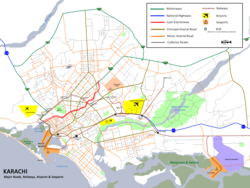| Manora Fort | |
|---|---|
| Part of Manora Cantonment | |
| Manora, Karachi, Pakistan | |
 Manora Fort was captured by the British in 1839, and then reinforced in 1888 Manora Fort was captured by the British in 1839, and then reinforced in 1888 | |
| Coordinates | 24°47′24″N 66°58′46″E / 24.79000°N 66.97944°E / 24.79000; 66.97944 |
| Type | Fort |
| Site information | |
| Controlled by | Pakistan Navy |
| Site history | |
| Built | 1797; 227 years ago (1797) |
| Materials | mud fortress (original) |

Manora Fort is a fort that was built to protect the harbour of Karachi. Originally erected as a mud fortress by the Talpur Mirs in 1797, the fort was captured by the British in 1839 - after which they seized control of Karachi and lower Sindh.
History
Establishment
Manora Fort was built by the Talpur dynasty in 1797 in order to protect the port, which handled trade with Oman and Bahrain. The fort was built at the top of cliffs that were 90–100 feet (27–30 m) in height, with a small mosque and a round tower. The fort was used to repel attacks by Qasimi pirates who threatened and sometimes raided Karachi Harbor in the early 19th century. Accounts and extent of piracy have been contested, and it has been suggested that piracy might have been used as a casus belli for the East India Company to seize control of the Persian Gulf region.
Capture by the British
On 1 February 1839 a British ship, HMS Wellesley (1815), anchored off the island of Manora. On 3 February, the ship opened fire on the fort. When British troops stormed the fort, they reportedly found it guarded by 4 or 5 men, who had no guns to fire back with, and so the fort was quickly surrendered by Wussul Ben Butcha, and Karachi with most of the area that now forms Pakistan captured.
After the fort was captured, the building was used as a residence for the Master-Attendant of the Karachi Port. St. Paul's church was built in the immediate vicinity in 1865. In 1888, the old fort was mostly removed, and the battery reinforced. A lighthouse was built by the British presence in 1889 to assist vessels approaching Karachi harbor.
Post-independence
After independence in 1947, Manora Fort became the main base of the Pakistan Navy, with berths for naval vessels located along the eastern edge of the island. The island has been governed as a military cantonment since then. The opening of the new Jinnah Naval Base at Ormara, 250 kilometers (160 mi) away, has meant that approximately half of the naval vessels have moved away from Manora. The fort now serves as the headquarters of the Pakistan Marines.
Gallery
-
Manora Fort as seem from its breakwater
-
Old anti-ship munitions at the fort
See also
- Manora Cantonment
- Manora, Karachi
- Karachi
- Pakistan Navy
- List of UNESCO World Heritage Sites in Pakistan
- List of forts in Pakistan
- List of museums in Pakistan
External links
References
- Manora Light House and Fort, Karachi
- ^ Murray (publishers.), John (1859). A handbook for India. Part ii. Bombay.
- ^ "Qasim Fort – The Flawless Complex". www.sindhidunya.com. Retrieved 30 August 2018.
- "Qasim Fort also known as Manora Fort". www.globalsecurity.org. Retrieved 30 August 2018.
- The Persian Gulf Pilot. J. D. Potter. 1875.
- Davies, Charles E. (1997). The Blood-red Arab Flag: An Investigation Into Qasimi Piracy, 1797-1820. University of Exeter Press. ISBN 978-0-85989-509-5.
- ibn Muḥammad al-Qāsimī, Sulṭān (1986). The myth of Arab piracy in the Gulf. London: Croom Helm. ISBN 0709921063. OCLC 12583612.
- Allana, Gulam (1969). Our Freedom Fighters, 1562-1947: Twenty-one Great Lives. Paradise Subscription Agency.
- ^ Murray (Firm), John; Eastwick, Edward Backhouse (1881). Handbook of the Bombay Presidency: With an Account of Bombay City. John Murray. p. 385.
- Baillie, Alexander Francis (1890). Kurrachee: (Karachi) Past, Present and Future. Thacker, Spink.
- "Marine Badges: Pakistan"
| Pakistan Armed Forces |
| Forts in Pakistan | ||
|---|---|---|
| Azad Kashmir |  | |
| Balochistan | ||
| Gilgit-Baltistan | ||
| Punjab |
| |
| Sindh | ||
| Khyber Pakhtunkhwa | ||
This article about a Pakistani building or structure is a stub. You can help Misplaced Pages by expanding it. |